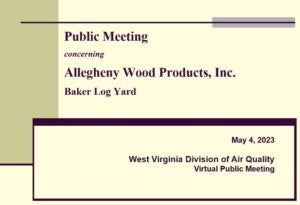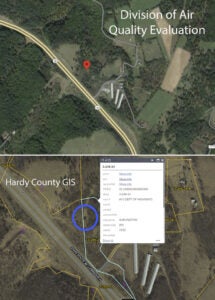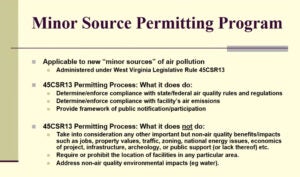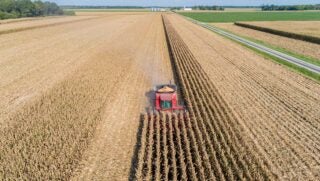Scores of concerned residents from Hardy County, West Virginia, joined a virtual public meeting Thursday evening to address plans for a timber fumigation facility, which would use the highly toxic pesticide methyl bromide, near a number of residential homes and agricultural properties.
The issue has grown increasingly heated in recent weeks after the West Virginia Department of Environmental Protection’s Division of Air Quality published its intent to approve the facility’s permit through a notice in the county’s newspaper.
However, the air permit is just the first step in the process. Steven Pursley, the state’s engineer assigned to the evaluation, said at the meeting that his permit does not trump local ordinance, such as zoning, and would not influence other types of permits that the company, Allegheny Wood Products International, would likely need to receive.
But tensions were clearly high during the more than two-hour-long event, with moments of frustration and emotion from both the commenters and presenters being commonplace.
“I farm for a living, and my farm is adjacent to this property,” one resident commented. “In my research, I found that it [methyl bromide] kills rats, mice, and squirrels that get minute exposure to this. … Exposing my cattle there and exposing my crop … am I not then contaminating all my county? Am I not affecting every consumer who buys beef?”

Pursley and his colleague, Terry Fletcher, reiterated the narrowness of their expertise and regulatory allowances when granting permits, stating that they focus solely on air-related issues — thus human health, water quality, property values, economic impact, traffic patterns, and more are not allowed to be considered by the agency.
“If the public has no influence in this proposal, as Steve has said, then this hearing only serves to or is meant to placate or satiate the public. Is that right?,” said G. Martin in the meeting chat. “This is a sham hearing.”
As the discussion went on, the permitting process itself, as well as site inspections — which take place roughly every two years unless specific complaints are voiced — raised even more pressing questions.
At one point, it was noted that the address listed in the evaluation — 148 Park Farm Drive, a piece of property owned by Robert Williams — was not the location that was mapped on the evaluation. Instead, the evaluator, who did his evaluation remotely using Google Earth, marked the fumigation site on what residents said was adjacent property several hundred feet away. That marked property is owned by the state highway department.
A comparison of the map included with the Division of Air Quality evaluation and through Hardy County GIS appears to back up the disconnect between the address submitted by Allegheny Wood Products and the actual mapped property.

Pursley said that his evaluation is only relevant for the listed property, though it was unclear whether he was referring to the address on the evaluation document or the marked parcel — or if he realized there had been a difference in them. He said that if the company wanted to move the facility, a new evaluation would be required.
According to the U.S. Environmental Protection Agency, human exposure to high concentrations of methyl bromide can cause central nervous system and respiratory system failures and can harm the lungs, eyes, and skin. It has largely been phased out across the country because of its extreme ozone-depleting properties, but timber fumigation is one of the remaining approved uses for the chemical (federal officials and land-grant university experts are diligently looking for alternatives).
According to Dr. Marshall White with Virginia Tech, the use of methyl bromide has been fully banned around many large population centers in Hawaii and Maryland, including the Baltimore region, which makes launching points such as eastern West Virginia a prime choice for timber companies readying their logs for overseas shipping.
At Thursday’s meeting, residents learned that this was only the third time a timber-fumigation application has been made in West Virginia, and in all instances, the location being sought was in Hardy County. One facility run by Allegheny Wood Products is currently in operation, and a second location recently closed down due to the land being sold, which prompted the timber company’s application in Baker.
The proposed Baker location is on land zoned agricultural, and local officials noted that a fumigation facility would need to be on industrial-zoned land — and rezoning seems to be further than ever as a possibility.
“Zoning was established in the early 1900s for the specific purpose of preventing industry from poisoning nearby residents,” said Hardy County Planner Melissa Scott. “No matter what some may say, protecting residents is still the primary point of zoning.”
She noted that local zoning is the only hurdle for developers that includes local input as opposed to the state’s. Scott went on to read a statement that was adopted by the Hardy County Commission as a direct response to the state DEP:
“This letter is to inform the West Virginia Department of Environmental Protection, the Division of Air Quality, that while all state and federal air quality requirements may have been met for issuance of a permit for a proposed log fumigation facility on Park Farm Drive in Baker, the requirements from Hardy County Zoning Compliance have not been met. Park Farm Drive and surrounding properties are currently located in an agricultural zoning district. The primary use of a property for activity centering around the use and storage of hazardous material for treatment of products at the location is only permitted in industrial zones with conditional approval. No applications or inquiries have been made to the Hardy County Planning Commission or office for such approval. While we understand that it is not customary for state offices to include county regulatory processes in its decisions, in this case, we implore you to consider the facts that the proposed process is not currently permitted in the proposed location as per the Hardy County Zoning Board.”
The permit for Allegheny Wood Products’ proposed facility said the company would use no more than 9.55 tons of methyl bromide per year, qualifying it as a “minor source” of air pollution. The threshold for becoming a “major source,” according to the Division of Air Quality, is 10 tons per year, which would open the company up to significantly more regulation. And because Allegheny’s proposed facility is several miles from its currently operating one, they are not considered contiguous, with permitting done separately for each location.
Many residents saw operating separate facilities in this manner, even if in the same county, as a loophole for companies to go beyond a total of 10 tons of air pollution a year.
“Are you really the Department of Environmental Protection? You’re not protecting the environment; you’re attacking our way of life in Hardy County,” one resident said. “We got to stop them.”
“Yes, we are the Division of Environmental Protection,” Pursley responded dryly to that question.

Pursley says there’s no cumulative analysis for “minor” air-pollution sources under the state’s rules, so the DEP didn’t consider the fumigation site in relation to any other potential environmental hazards in the community. The agency also said that even though the half-life of methyl bromide may be more than a year, the DEP’s standards allow for it to only consider new emissions when quantifying the tonnage of a pollutant.
“I’ve always felt that the role of government, its primary purpose, is for the health, safety, protection, and well-being of the citizens that they govern,” resident Ron Frost said to the state officials. “And in saying that, we keep hearing a lot of what your job isn’t: It isn’t to deal with the water, it isn’t to do with our natural resources, such as wildlife. It sounds like a narrow window that you all are responsible for, and yet, you are a major part of the permitting process.”
Frost went on to note that in a state known for its coal production, how dangerous sites can be for the community even when all regulations are technically and legally met. And he said that this is even more dire considering how old and potentially outdated many of the state and federal codes are.
All comments and questions from the public meeting will be added to the official record, and the comment period has been extended to 5 p.m. May 12.
Ryan Tipps is the founder and managing editor of AGDAILY. The Virginia Tech graduate has covered farming since 2011, and his writing has been honored by state- and national-level agricultural organizations.



